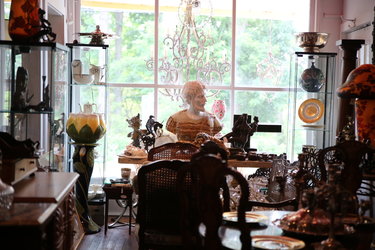Westerlo antiques store finds its footing in the digital era
WESTERLO — Standing in Ray Carucci’s Westerlo antiques store — Chipped, Tarnished, and Torn — it’s easy to forget where you are.
Up against one of the shop’s windows, facing inward, is a neoclassical bust of a presumably important, presumably Roman character, with his breastplate colorfully decorated. In the main room, there’s a flame-shaped gas-pump topper that Carucci turned into a lamp.
There’s a boudoir room, too, with fine garments that look like they might be from the 1920s. Elsewhere, among a group of conventional guitars, is one with an unusual bowl-like body — an instrument that’s both familiar and alien, as if it were extracted from one of Jon Hassell’s fourth worlds.
Eclecticism is far from unusual in an antique shop, but Carruci’s is still unusual. His wares are more curated than assorted, and each item — regardless of its actual value — looks like it’s waiting to be brought back to a pre-war apartment in New York City’s Upper West Side.
“What Ray has been trying to do is create Hudson North,” Carucci’s friend Bonnie Kohl-Laub told The Enterprise this week, referring to the Columbia County town where antique dealers sell high-end furniture and other used goods geared toward the region’s affluent creative class.
Chipped, Tarnished, and Torn’s inventory lacks the jaw-dropping prices from Hudson — “The exchange rate is different there,” Carucci joked — but has the same reverence for history and design.
Nestled among the guitars in his shop are four Beatles dolls, which Carucci said he picked up because they were rare and it was an example of “some of the worst cross-marketing I ever saw.”
As Carucci tells it, the dolls were bonus items given out with the purchase of some household item — essentially a way to get kids to start marketing the stuff at home.
“A commercial comes on that says, ‘Boys and girls, if you want your own set of the Beatles, tell your mom to buy Comet Cleanser or Spic and Span,’” Carucci explained. “So the little boy goes with his mom to the supermarket and says, ‘Mommy, please buy this so I can get Paul and Ringo.’ It’s really weird, because what kid is going to remember to tell his mom to buy Comet Cleanser?’
Carucci said that it was rare to have the whole set, because the Ringo dolls were not always as tenderly kept as the John and Paul ones.
“I like the rare and the unusual,” Carucci said as he summarized his field of interest to the extent that it can be. “... I embrace anything that has craftsmanship. And understated elegance. If it’s understated elegance, it’s something that is so magically meaningful to me.”
Carucci is a fast-mouth New Yorker (although he was born in Westchester, he said, and now lives in Westerlo) with a background that’s as eclectic as his inventory — he’s dressed sets for movies and TV shows, taught global economics in Michigan, and, as a restaurateur, would “feed Ralph Lauren every day.”
That full immersion in so many other areas is likely what allows Carucci to understand the depth and meaning of all his artifacts, and then connect those meanings to the values of his customers, who he’ll sometimes call up and say, “I have something that you’re going to love.”
“I’ve never had anyone turn one of my suggestions down,” Carucci boasted.
He’s been running Chipped, Tarnished, and Torn for four years, he said, and has recently let it become his primary focus. He used to have other antiques stores around the Hudson Valley, but, now, he can more easily turn into bed after a long day’s work.
But this isn’t necessarily a wind-down period for Carucci, who finds himself innovating and adapting even as business goes well.
He will soon launch a website for the store, part of his entree into the digital realm, which is rapidly encroaching on the material world, even when in-person transactions are involved.
His best customers, he said, are people in their mid-20s, who rarely walk around with cash on hand, and may not even know which pocket their cards are in, opting instead to pay digitally with a watch or phone.
“If I’m not digital, if I’m not doing these things, I’m lost,” Carucci said. He contrasted his position with that of a bank he’s familiar with, which despite the popularity of platforms like Venmo and PayPal, don’t accept transfers from those apps. “They don’t have a computer in the bank,” Carucci explained, “because the girls are looking at cosmetic tips.”
He said that Instagram and the store’s outdoor space are what saved him during the COVID-19 shutdown orders, when non-essential businesses were closed to slow the spread of the coronavirus.
With social media, Carucci could provide all the visual information a buyer might need, and still advertise or allow for inspection in the outdoor space.
“The pandemic gave us a different perspective,” Carucci said of modern means of business. “But in all the businesses I’ve had, I evolve, I change, I listen to my customers.”
For Carucci, whose life is a varied tapestry, change is a good thing. As he said gleefully in the midst of a tangent on the social validity of putting out mismatched china, “It’s 2021. There’s no f---ing rules anymore.”



